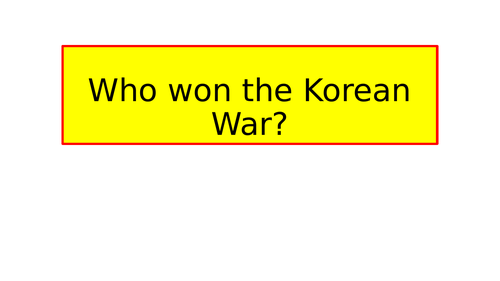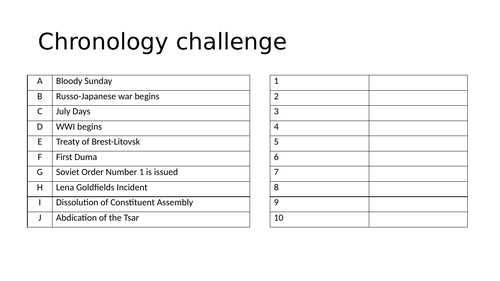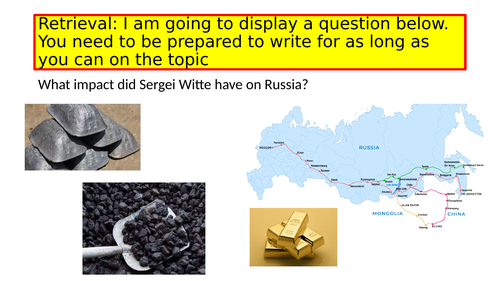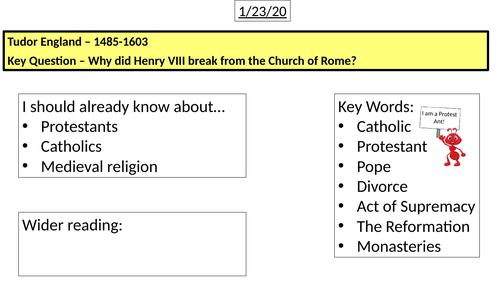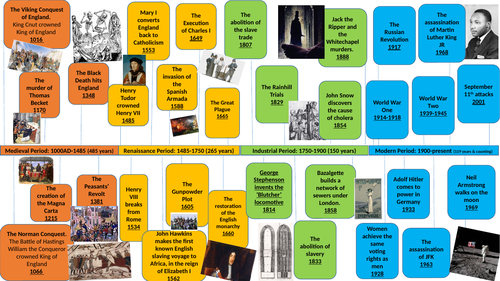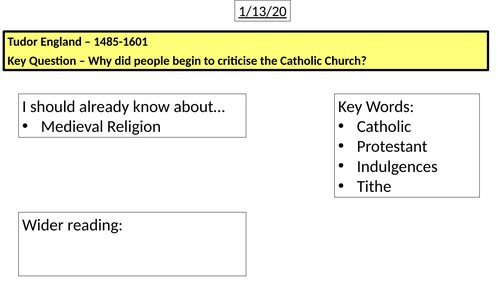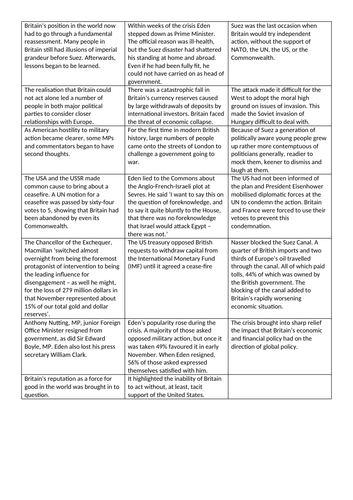
170Uploads
40k+Views
18k+Downloads
All resources

Fan 'n' pick - Lenin's Russia
A set of Fan ‘n’ pick cards which cover the course content for A-level students on the topic of Lenin’s rule. Also included is a data capture sheet for students to pre-assess their level of knowledge on the different topics such as war communism and the NEP. This has worked effectively as a revision tool, or retrieval tasks.

Who won the Korean War?
A GCSE lesson in which students analyse and evaluate the impact of the Korean War. Students will compare the gains and losses of the countries and organisations involved in the war. This leads to an exam practice question on the 16 mark essay in which students must decide who won and lost.

How did the Korean War end in Stalemate?
A GCSE lesson in which students will understand how the Korean War ended in a stalemate. Students will use a skim read task to understand the events, before applying their understanding to an explanation task in which students must explain how one event caused the next. In doing so, students work towards a ‘write an account’ style question on the events of the Korean War. Students will finish with a judgement about why the Korean War ended in stalemate by deciding on which statement they agree with most. Suited for AQA Conflict and Tension in Asia specification.

UN involvement in Korean War
A GCSE resource for the conflict and tension in Asia unit. Students will understand the reasons for UN involvement, and analyse the role of the USA in the process. Students will apply their understanding of the causes so far to reach a judgement on the country/organisation most responsible for the outbreak of war.

Russia - Civil War and Bolshevik victory
A lesson in which students analyse the reasons for Bolshevik victory in the Civil War. Students will sort evidence in to two main categories: red strengths and white weaknesses, before categorising further in to factors. Students will use these factors to help them to create links between the factors in a linking lines activity. Students will finish by considering whether they think the outcome of the Civil War was a foregone conclusion.

Russia - success of War Communism and NEP
A lesson in which students review their learning on War Communism and NEP to consider the more successful policies. Students will analyse success by considering their achievement according to criteria such as unity in the Bolshevik party, and increasing agricultural production. Students are required to reach judgements as to which policy was better according to each before reaching an overall conclusion about which was better for the Bolshevik party. This enables students to consider success from a different perspective beyond economic success.

Russia - Lenin's legacy
An A-level lesson in which students analyse and evaluate the impact of Stalin on Russia. Students will progress through tasks which enable them to consider successes and failures, before categorising and prioritising their information to form the basis of an essay plan. Students will reach a judgement on an essay question about Lenin’s greatest achievement. Works well to consolidate their understanding on Lenin’s rule as it offers an opportunity to recap many of the key ideas.

Russia - Stolypin's policies
An A-level lesson in which students will evaluate and analyse the the success of Stolypin’s policies, with a focus on his land reforms. Students will use the aims of Stolypin as a way in which to measure his success. Students will work in groups to assess the level of success in comparison to one key aim, before reporting back to other students. Studnets will finish with a judgement in respones to the essay style question.

Russia - 1905 Revoultion
An A-level lesson in which students examine the events of 1905. Students will create a living graph to show the anger felt by Russians, along with the level of threat posed to the Tsar. Students will examine evidence to conclude whether the events of 1905 deserve to be known as a revolution or not.

AQA 8145 Medicine - Medieval Doctors
A GCSE lesson in which students will compare the effectiveness of different types of doctors who were available during the Medieval period. Students make the comparisons by completing top trumps cards for apothecaries, barber surgeons, physicians and wise women and evaluate their training, available treatments and cost. Students will also match up the Medieval patient with the most appropriate doctor to demonstrate understanding of the different roles that they played.

Russia: Witte's economic reforms
An A-level lesson in which students prepare a response to the essay question: ‘How far did Witte succeed in his plans to reform Russian industry in the years 1893-1903?’.
Students will use a card sort to organise their paragraphs and to form their argument. Students will use the main activities to put together an essay plan to answer the question. The essay plan provides structured support for students who may need it. They will finish by reaching judgements on essay questions on the same topic with different wording so that students can learn to focus their argument on the question specifically.

Russia 1894-1941: Opposition to Nicholas II
An A-level lesson in which students evaluate the threat posed by the four main opposition groups to Nicholas II at the start of his rule. Students will use criteria such as popularity, how revolutionary, how united to reach an overall judgement on the significance of the threat each group posed, and will record their findings in top trumps cards to allow direct comparisons. Students can work in groups and teach each other, or independently. Students will finish by reaching a judgement on the group that posed the greatest threat, similar to the skills required in the short essay question.

Russia 1894-1941: problem of Reform
An A-level lesson in which students must analyse the barriers to reform in Russia at the beginning of Tsar Nicholas II’s rule. Students will describe, explain and evaluate the significance of the barriers to reform to understand why little progress was made. This will form the foundation for understanding why there was significant opposition to Nicholas II. Students will ultimately reach a judgement on how well Nicholas was suited for the job, and the extent to which he can be blamed for the issues facing Russia.

Russia's problems 1894 (OCR A-level)
An introduction to OCR Unit 2, Russia 1894-1941. Students will understand and analyse the key problems that Russia faced in 1894 and consider whether Nicholas II was the right man for the job. Students will develop links between problems to begin to understand the interplay of political, economic and social factors.

The Reformation - Why did Henry break from Rome?
A KS3 lesson which includes practice of a GCSE style question. Students will need to have knowledge of the Break from Rome and will build on their knowledge to produce a written answer. Students will produce sequence events to show the connections to be able to explain the Reformation. All resources needed are included in the PowerPoint.

What was Tudor England like?
A KS3 introductory lesson to the topic of the Tudors. Students will gain an introduction to key themes and a sense of period as they understand life in Tudor England.

Why did people criticise the Catholic Church?
A KS3 lesson which introduces the split between Catholics and Protestants before students study the Reformation in England. Students will consider why people began to criticise the Catholic Church before writing their own version of Luther’s 95 theses to demonstrate their understanding.

Making of modern Britain - Suez Crisis
An A-level lesson in which students examine the significance of the Suez Crisis on Britain. Students will sequence the events leading to the crisis, before analysing the impact of the crisis on Britain, and in particular will gain an understanding of how Britain’s place in the world changed as a result of Suez.

Making of Modern Britain - youth culture 1950s
An A-level lesson in which students examine the reasons for the development of youth culture in the 1950s. Students will use their understanding to examine three conclusions to focus on exam technique, and consider the strengths and weaknesses with the conclusions. Furthermore, students will link their understanding of youth culture to other social changes to analyse the moral panic and reactions to the development of youth culture.

Making of Modern Britain - Conservative fall 1964
An A-level lesson in which students examine the causes of the Conservative fall from power in 1964. Students will work in groups to evaluate the relative significance of a range of factors before reaching their overall judgement.


